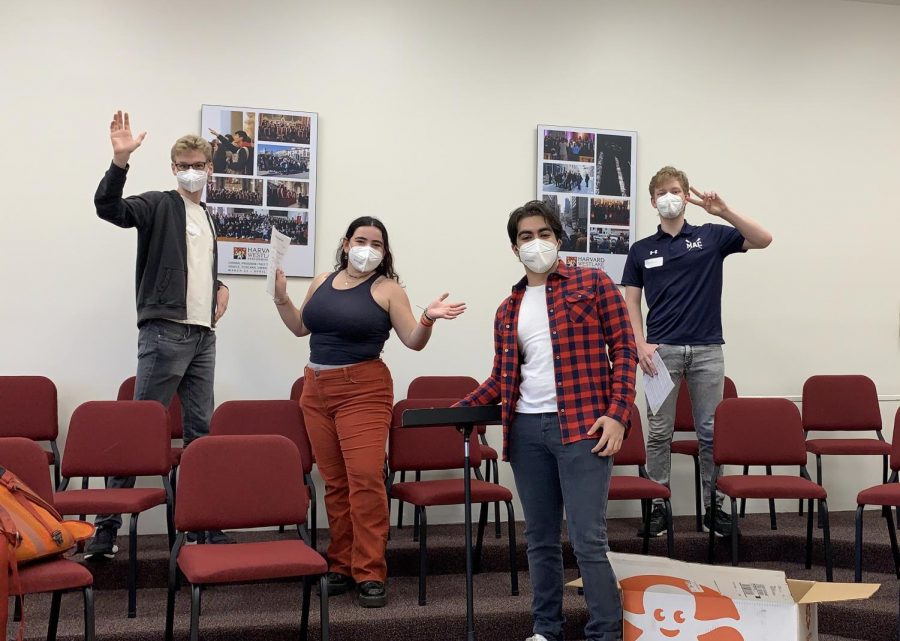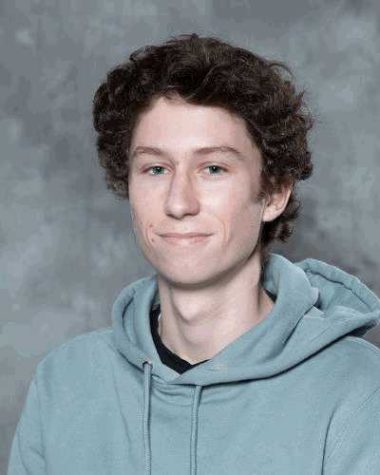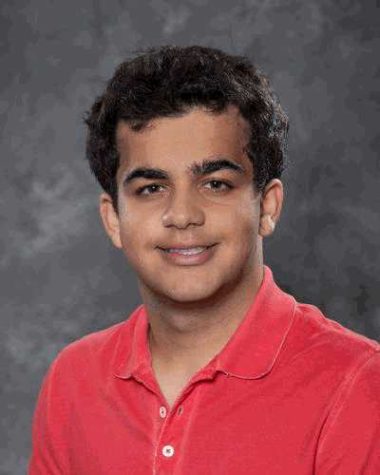Zooming into the Classroom
Used with permission of Alon Moradi.
From Left: Quinn Callaghan ’21, Maddie Boudov ’21, Alon Moradi ’21 and James Johnson Brown ’21 pose in their choir classroom.
March 25, 2021
Alon Moradi ’21 opened his computer Feb. 23 to an email from President Rick Commons announcing that students would be allowed to return to campus March 9. Mixed reactions echoed throughout the school community. Many students, like Moradi, could practically hear the quad erupting in chatter before their 8:30 a.m. classes, anxiously anticipating the moment they would step foot on campus to be greeted by their peers and teachers. At the end of the third quarter, however, other students like Sofia Li ’22 were more hesitant to return to an in-person school environment, as they have adapted to their domestic work settings.
Although individual circumstances may vary, each grade level faces a unique set of circumstances when deciding whether to return back to school or not.
As a junior, Li doesn’t see a potential return to in-person school as necessary, whereas Moradi, a senior, sees it as a pivotal step to concluding his high school experience. Moradi said that being in-person for the final months of the semester is important because he seeks tangible experiences that he can link with his memories of senior year.
“I am a very spatial person,” Moradi said. “To have memories and experiences of my senior year which are particularly at Harvard-Westlake is something that I really value. It is absolutely worth it to return to school.”
Moradi, an actor and Chamber Singers section leader, said that learning on Zoom makes it especially difficult to immerse himself in the performing arts community. He said he hopes that returning to school can salvage some of the experiences he missed this year and allow him to make an impression on his peers.
“At Harvard-Westlake, senior year is set up as the year that you are able to give back and leave a great impact on your community,” Moradi said. “We haven’t been able to achieve the same sense of camaraderie as a cast or ensemble and that really hinders our work. I just have to accept that’s the way it is until we go to in-person learning.”
Conversely, junior students said they have generally not been as eager to return back to campus. Li said that she is more hesitant to return because she is comfortable enough learning at home and doesn’t want to risk being distracted by her cohort. She said she is worried that the potential academic implications of being distracted in every class is not worth the tradeoff of increased social interaction.
“I don’t think I am going to go to campus yet just because I think it’s going to be really difficult for me to talk to my class while my cohort is in class with other people,” Li said. “As a junior, since the workload is so much, it’s not necessarily worth it to experiment and risk getting distracted.”
Sophomore students have their own unique set of circumstances as well: they are generally unfamiliar with the upper school campus and culture. Will Chandrasekhar ’23 said that he will not return to school as a sophomore because the monitored social environment and the virtual classes on campus would hinder his experience as a new upper school student.
“I don’t think I’ll be going back while the temporary structure for our return is still in place,” Chandrasekhar said. “As a sophomore, I personally don’t think that it is worth it because of the limited social interaction and continuation on Zoom, even while we are at school.”
Just as each grade level has a unique perspective on returning to school, so do upper school deans and faculty members. Upper School Dean Sharon Cuseo said she is excited to return to school because she yearns for the opportunity to further her relationships with her students. She said that despite the inconvenience of extensive safety protocols, it is absolutely worth it to return to school.
“I’m excited about the prospect of seeing students again and for students to see each other,” Cuseo said. “The psychological toll has been so much greater, I believe, on all of us than anyone ever imagined. So, giving people a chance to interact, even in cohorts and behind masks, seems worth it to me.”
Cuseo added that the extensive safety protocols are somewhat inconvenient and disappointing. However, there are more upsides than downsides in returning to campus, even though the circumstances are imperfect, she said.
“The tough part as a dean is that I had hoped for the opportunity to meet with students in my office,” Cuseo said. “But because I won’t be one of the adults associated with a cohort, any student meetings I have will have to take place outside somewhere. It’s less than ideal, but still worth it to be able to talk to people in person.”
Mathematics Teacher Josh Helston, on the other hand, said he is looking forward to returning to in-person instruction but does not feel it is particularly beneficial to begin teaching from campus.
“Although I am excited to come to campus and chaperone some events, I believe it is more reasonable to continue teaching remotely in my individual circumstance,” Helston said. “It would be worth it to me to see my students, colleagues and friends, but it is not worth it to still continue to teach from a computer in a classroom as opposed to teaching from a computer at home.”
Helston said that as a math teacher, being with students in a classroom is extremely useful. However, the new safety protocols for an in-person return do not allow this sort of interaction.
“For everyone’s safety, the maximum classroom occupancy requirements would mean I would still need to be teaching remotely whether I were on campus or at home,” Helston said. “[However], returning to in-person school, with full occupancy, would allow me to more authentically compare my teaching successes and challenges with past years. It would also allow me to present some of the concepts in multiple ways which is a great advantage to learners.”
Perspectives on returning to school also differ among faculty members based on their specialized areas of study and their individual preferences. History Teacher Celia Goedde, for example, has a different philosophy on teaching from campus than Helston does. Goedde said she prefers teaching from school and plans to continue doing so through the end of the school year.
“I will keep teaching from campus as long as I am satisfied that it is safe to do so,” Goedde said. “I have been favorably impressed with the precautions Harvard-Westlake has taken to bring more students on to campus. I have been teaching from campus throughout this entire year and my plan is to continue doing that.”
Goedde said she views the return to campus as beneficial because it is an opportunity for the school community to reconvene with a new sense of enthusiasm.
“For myself, it is most certainly worth it [to return to campus],” Goedde said. “I love seeing my colleagues who are also teaching from campus. They have been a valuable support network throughout this entire experience. The energy on campus this past week with more students has been really great. I’ve so enjoyed seeing my current students in person and catching up with students from previous years.”

































